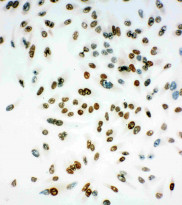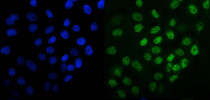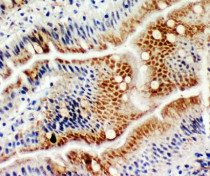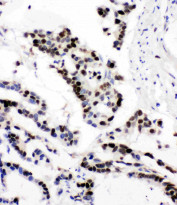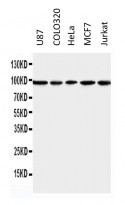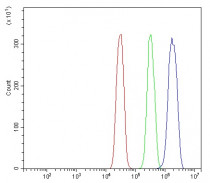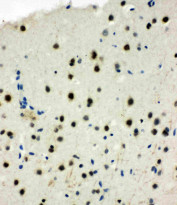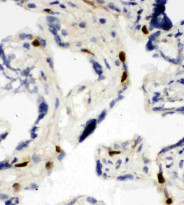ARG40479
anti-MCM6 antibody
anti-MCM6 antibody for Flow cytometry,ICC/IF,IHC-Frozen sections,IHC-Formalin-fixed paraffin-embedded sections,Western blot and Human,Mouse,Rat
Overview
| Product Description | Rabbit Polyclonal antibody recognizes MCM6 |
|---|---|
| Tested Reactivity | Hu, Ms, Rat |
| Predict Reactivity | Hm |
| Tested Application | FACS, ICC/IF, IHC-Fr, IHC-P, WB |
| Host | Rabbit |
| Clonality | Polyclonal |
| Isotype | IgG |
| Target Name | MCM6 |
| Antigen Species | Human |
| Immunogen | Synthetic peptide corresponding to aa. 589-605 of Human MCM6. (ESEDFIVEQYKHLRQRD) |
| Conjugation | Un-conjugated |
| Alternate Names | p105MCM; P105MCM; DNA replication licensing factor MCM6; MCG40308; EC 3.6.4.12; Mis5 |
Application Instructions
| Application Suggestion |
|
||||||||||||
|---|---|---|---|---|---|---|---|---|---|---|---|---|---|
| Application Note | IHC-P: Antigen Retrieval: By heat mediation. * The dilutions indicate recommended starting dilutions and the optimal dilutions or concentrations should be determined by the scientist. |
Properties
| Form | Liquid |
|---|---|
| Purification | Affinity purification with immunogen. |
| Buffer | 0.2% Na2HPO4, 0.9% NaCl, 0.05% Thimerosal, 0.05% Sodium azide and 5% BSA. |
| Preservative | 0.05% Thimerosal and 0.05% Sodium azide |
| Stabilizer | 5% BSA |
| Concentration | 0.5 mg/ml |
| Storage Instruction | For continuous use, store undiluted antibody at 2-8°C for up to a week. For long-term storage, aliquot and store at -20°C or below. Storage in frost free freezers is not recommended. Avoid repeated freeze/thaw cycles. Suggest spin the vial prior to opening. The antibody solution should be gently mixed before use. |
| Note | For laboratory research only, not for drug, diagnostic or other use. |
Bioinformation
| Database Links |
Swiss-port # P97311 Mouse DNA replication licensing factor MCM6 Swiss-port # Q14566 Human DNA replication licensing factor MCM6 |
|---|---|
| Gene Symbol | MCM6 |
| Gene Full Name | minichromosome maintenance complex component 6 |
| Background | The protein encoded by this gene is one of the highly conserved mini-chromosome maintenance proteins (MCM) that are essential for the initiation of eukaryotic genome replication. The hexameric protein complex formed by the MCM proteins is a key component of the pre-replication complex (pre_RC) and may be involved in the formation of replication forks and in the recruitment of other DNA replication related proteins. The MCM complex consisting of this protein and MCM2, 4 and 7 proteins possesses DNA helicase activity, and may act as a DNA unwinding enzyme. The phosphorylation of the complex by CDC2 kinase reduces the helicase activity, suggesting a role in the regulation of DNA replication. Single nucleotide polymorphisms in the intron regions of this gene are associated with differential transcriptional activation of the promoter of the neighboring lactase gene and, thereby, influence lactose intolerance in early adulthood. [provided by RefSeq, May 2012] |
| Function | Acts as component of the MCM2-7 complex (MCM complex) which is the putative replicative helicase essential for 'once per cell cycle' DNA replication initiation and elongation in eukaryotic cells. The active ATPase sites in the MCM2-7 ring are formed through the interaction surfaces of two neighboring subunits such that a critical structure of a conserved arginine finger motif is provided in trans relative to the ATP-binding site of the Walker A box of the adjacent subunit. The six ATPase active sites, however, are likely to contribute differentially to the complex helicase activity. [UniProt] |
| Cellular Localization | Nucleus. Note=Binds to chromatin during G1 and detach from it during S phase. [UniProt] |
| Calculated MW | 93 kDa |
| PTM | O-glycosylated (O-GlcNAcylated), in a cell cycle-dependent manner. [UniProt] |
Images (9) Click the Picture to Zoom In
-
ARG40479 anti-MCM6 antibody ICC image
Immunocytochemistry: HeLa cells stained with ARG40479 anti-MCM6 antibody.
-
ARG40479 anti-MCM6 antibody ICC/IF image
Immunofluorescence: A431 cells were blocked with 10% goat serum and then stained with ARG40479 anti-MCM6 antibody (green) at 5 µg/ml dilution, overnight at 4°C. DAPI (blue) for nuclear staining.
-
ARG40479 anti-MCM6 antibody IHC-Fr image
Immunohistochemistry: Frozen section of Rat intestine tissue. The tissue section was blocked with 10% goat serum. The tissue section was then stained with ARG40479 anti-MCM6 antibody at 1 µg/ml dilution, overnight at 4°C.
-
ARG40479 anti-MCM6 antibody IHC-P image
Immunohistochemistry: Paraffin-embedded Human intestinal cancer tissue stained with ARG40479 anti-MCM6 antibody.
-
ARG40479 anti-MCM6 antibody WB image
Western blot: U87, COLO320, HeLa, MCF7 and Jurkat cell lysates stained with ARG40479 anti-MCM6 antibody.
-
ARG40479 anti-MCM6 antibody WB image
Western blot: 50 µg of sample under reducing conditions. Mouse small intestine and Mouse spleen lysates stained with ARG40479 anti-MCM6 antibody at 0.5 µg/ml dilution, overnight at 4°C.
-
ARG40479 anti-MCM6 antibody FACS image
Flow Cytometry: SiHa cells were blocked with 10% normal goat serum and then stained with ARG40479 anti-MCM6 antibody (blue) at 1 µg/10^6 cells for 30 min at 20°C, followed by incubation with DyLight®488 labelled secondary antibody. Isotype control antibody (green) was rabbit IgG (1 µg/10^6 cells) used under the same conditions. Unlabelled sample (red) was also used as a control.
-
ARG40479 anti-MCM6 antibody IHC-P image
Immunohistochemistry: Paraffin-embedded Rat brain stained with ARG40479 anti-MCM6 antibody.
-
ARG40479 anti-MCM6 antibody IHC-Fr image
Immunohistochemistry: Frozen section of Human placenta tissue stained with ARG40479 anti-MCM6 antibody.
